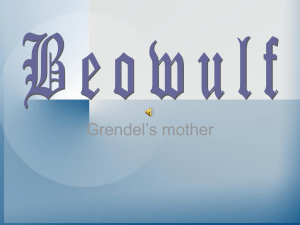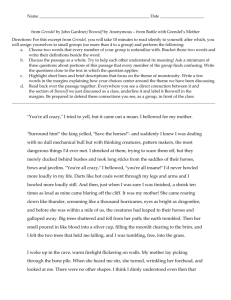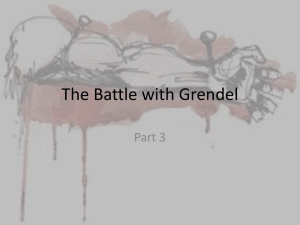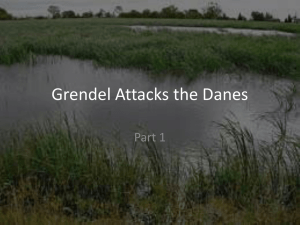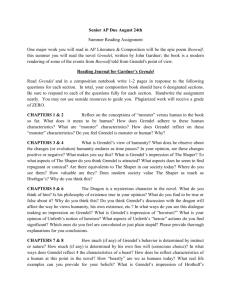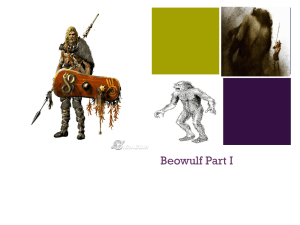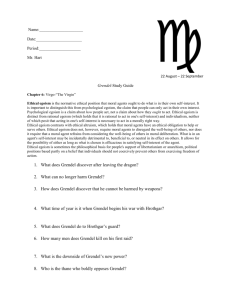File
advertisement
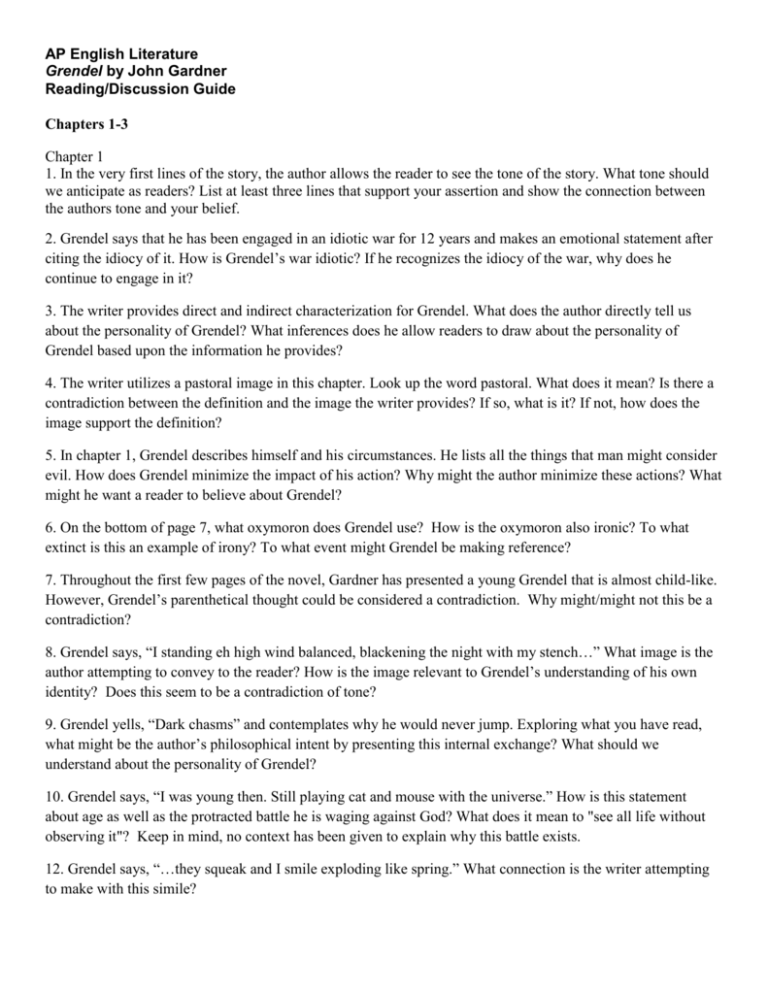
AP English Literature Grendel by John Gardner Reading/Discussion Guide Chapters 1-3 Chapter 1 1. In the very first lines of the story, the author allows the reader to see the tone of the story. What tone should we anticipate as readers? List at least three lines that support your assertion and show the connection between the authors tone and your belief. 2. Grendel says that he has been engaged in an idiotic war for 12 years and makes an emotional statement after citing the idiocy of it. How is Grendel’s war idiotic? If he recognizes the idiocy of the war, why does he continue to engage in it? 3. The writer provides direct and indirect characterization for Grendel. What does the author directly tell us about the personality of Grendel? What inferences does he allow readers to draw about the personality of Grendel based upon the information he provides? 4. The writer utilizes a pastoral image in this chapter. Look up the word pastoral. What does it mean? Is there a contradiction between the definition and the image the writer provides? If so, what is it? If not, how does the image support the definition? 5. In chapter 1, Grendel describes himself and his circumstances. He lists all the things that man might consider evil. How does Grendel minimize the impact of his action? Why might the author minimize these actions? What might he want a reader to believe about Grendel? 6. On the bottom of page 7, what oxymoron does Grendel use? How is the oxymoron also ironic? To what extinct is this an example of irony? To what event might Grendel be making reference? 7. Throughout the first few pages of the novel, Gardner has presented a young Grendel that is almost child-like. However, Grendel’s parenthetical thought could be considered a contradiction. Why might/might not this be a contradiction? 8. Grendel says, “I standing eh high wind balanced, blackening the night with my stench…” What image is the author attempting to convey to the reader? How is the image relevant to Grendel’s understanding of his own identity? Does this seem to be a contradiction of tone? 9. Grendel yells, “Dark chasms” and contemplates why he would never jump. Exploring what you have read, what might be the author’s philosophical intent by presenting this internal exchange? What should we understand about the personality of Grendel? 10. Grendel says, “I was young then. Still playing cat and mouse with the universe.” How is this statement about age as well as the protracted battle he is waging against God? What does it mean to "see all life without observing it"? Keep in mind, no context has been given to explain why this battle exists. 12. Grendel says, “…they squeak and I smile exploding like spring.” What connection is the writer attempting to make with this simile? 13. Grendel introduces readers to his mother through a flashback. What should we understand about the relationship between mother and son at the time of the flashback? What does the dragon’s revelation imply about his mother’s maternal instincts? 14. Grendel’s attack results in death and the sating of his appetite. How does the image provided by Grendel of his actions prohibit this from being seen as a murder? How are his actions human although he is presented as monster? While very obvious, what is the writer attempting to say about the nature and existence of man? 15. Grendel states that the king does not go in because he has theories of his own. How is Grendel’s assumption also an implied allusion? How are these theories a source of external conflict for Grendel? Chapter 2 1. Grendel talks about the games he used to play when he was young and the possible time that has elapsed between the two extremes. How does this serve as a contradiction for the reader based upon the diction that Grendel uses? 2. In a flashback to his early childhood, Grendel mentions “large old shapes.” What seems to be the relationship between those shapes and Grendel? What information are we given about the familial structure? 3. What realization does Grendel come to once he is trapped in the tree and encounters the bull? What does Grendel believe are the philosophical implications of these two entities meeting? 4. What does Grendel mean when he says, “there was nothing, or, rather, there was everything but my mother”? What implications about the mother-son relationship is the author attempting to imply? How might Grendel’s understanding of this relationship also be a loss of innocence? 5. How is Grendel’s statement, “I create the whole universe, blink by blink” both arrogant and slightly pathetic? What are the philosophical implications of this statement? 6. What “TWO” possible reasons why the author allows readers to see Grendel’s mother’s maternal instinct at the end of the chapter? What is he attempting to show the readers? What idea might he be attempting to contradict? 7. Grendel once agains waxes philosophical when he states, “the world is all pointless accident.” How does this statement show Grendel’s increased maturity? Chapter 3 1. Grendel says he was hit by a battle-ax. How should we as readers interpret his reaction? What information allows you to make this interpretation? 2. Why does the author allow Grendel to mention that the sheep and goats had twins in the spring? How might this implicit reference function as an astrological allusion? How might this reference function as another philosophical point the writer wants us to understand? What should we understand based on the philosophy the author is espousing? 3. What does Grendel believe about the behavior and actions of men? How are these actions contradictions to what Grendel believes about the treatment of neighbors and nature? 4. What feelings does Grendel seem to have for the Shaper? How are these feelings paradoxical for the character Grendel, but illuminating for the reader? What does the reader understand about the nature of the creature as well as the philosophy that drives him? 5. What truth about poetry does Grendel discover? 6. At the end of the chapter, Grednel screams and crawls on all on fours. Why do you believe it is necessary that readers “observe” these actions? Of what is the writer attempting to remind the reader? Why might the reader need this reminder? Why might this be a reminder for the character Grendel as well? Chapters 4-6 Chapter 4 1. Grendel asserts that the Shaper stays with Hrothgar because of “the pride of creation.” What might he mean by the phrase “grave mor(t)ality”? By imbedding a “t” in the middle of morality, the writer adds new dimensions to the text thus giving a reader a choice of diction. Which word would you choose? Why is this word most relevant to what you have read thus far? 2. What is Hrothgar’s purpose for building Herot? What is Grendel’s reaction to this building? 3. In the forest, Grendel steps on a snake, yet is not bitten. How is meeting between Grendel and the snake both literal and figurative? What is the implied relationship between Grendel and the snake? 4. How does Grendel say the Shaper is able to shape the world? In what way is assumption 100 % true? 5. What does Grendel understand after hearing the story of Cain and Abel? What spiritual impact does this have on Grendel? Why is the impact short-lived? 6. What presence does Grendel feel in the darkness? What is it asking of Grendel? In what way is this presence a contradiction for him? 7. As Grendel contemplates the presence he feels, he encounters a snake, again. How does the author manipulate the symbolism of the snake so that it also reflective of Grendel? 8. After his conversion, Grendel returns home to his mother. Although she is without words, how do her actions show her maternal instinct? What could also be implied by her lack of words versus actions with Grendel? Chapter 5 1. As readers, what could be we infer about the personality of Grendel based on the dragon’s description of a scared Grednel? 2. By stating the dragon is a serpent to the core, what symbolic relationship is the writer attempting to imply? How might this different from other times that readers see Grendel with a serpent? 3. Why does Grendel visit the dragon? What is he seeking? What does the dragon tell about him and about the “word”? 4. How does the dragon seem to perceive man? What is man’s mind? 5. What is the Shaper’s purpose according to the dragon? 6. The dragon goes into a long diatribe and tries to explain some things to Grendel. What does the dragon mean by: a. "Knowledge is not cause." b. "Connectedness is the essence of everything." c. "The essence of life is to be found in the frustrations of established order." d. "Novel order (is) a primary requisite for important experience." e. "Importance is derived from the immanence of infinitude in the finite." f. "Expression is founded on the finite occasion. It is the activity of infinitude impressing itself on its environment." 7. In his attempt to explain the difference between Importance and Expression to Grendel, the dragon uses the examples of the difference between vegetables and animals and the difference between an angry man and a rock. What is he attempting to get Grendel to see? 8. In what way does Grendel improve man? 9. The dragon provides Grendel with his ambition. What is the dragon’s ambition? What is his final advice and motto? How are these relevant to Grendel? 10. In what way might Grendel have a cage or limited mind? Has his interactions with humans created this mindset? Chapter 6 1. What had the dragon done for Grendel? Why does Grendel believe this to be a bad thing? 2. Often times, writers will foreshadow events in a text. However, when exploring the parenthetical thoughts of Grendel is this foreshadowintg? Flashback? Or both? What leads you to your conclusion? 3. What does Grendel realize about himself that changes his perception of the Shaper’s song? 4. In this chapter, Grendel states, “I had become.” What had Grendel become? How does this becoming influence his personality? 5. In chapter 5, Grendel discussed being cursed by the dragon. Could Unferth’s understanding that Grendel is capable of human speech also be construed as a curse? If so, why? If not, then why is it a blessing? 6. What metaphor Unferth use to begin his discussion of heroism? What does the metaphor say about Unferth and his understanding of Grendel? 7. What does Grendel assert about heroes? Why does Grendel’s mocking of heroe’s unsettle Unferth? What as readers should we understand about Unferth? 8. What is inner heroism? Why would this idea be applicable to Unferth? 9. What does Unferth reveal about himself and his expectations while waiting at/in Grendel’s lair? 10. Why did Grendel return Unferth? How is Unferth affected by this return? 11. At the beginning of the story, Grendel talks about his war with God. How has he (Grendel) in a sense become a god whom Unferth must wage a war? 12. How is the conversation between Grendel and Unferth similar to the conversation between Grendel and the dragon? What is at the heart of each of these conversations? Big Ideas/After Reading – Chapters 1-6 Directions: The questions listed below require you to explore what you have read thus far and create an answer that encompasses your reading in its totality INTERNAL CONFLICT---After being introduced to Grendel, and the world in which he lives, readers are also introduced to a character whose internal conflict results in external conflicts. Are the internal conflicts the reasons for the external conflicts or are the external conflicts the reasons for the internal conflicts? How have these conflicts impacted the characters emotional and psychological state? What information in the texts leads you to your conclusion? (Please you use specific examples from the text to support your answers.) CHARACTERIZATION---Throughout the first six chapters we watch as Grendel finds himself in a philosophical conundrum vacillating between multiple extremes. Do a search for the philosophical idea of existential nihilism. In your response, include the definition of existential nihilism, explain whether or not Grendel fits the definition that you find. If he does fit the definition, what information from the text helps you determine that? If he does not, what about him contradictions the definition you have chosen? Chapters 7-9 are due Chapter 7 1. At the start of the chapter, how does Grendel seem to perceive himself? How is this perception part true and part delusion? Besides the dragon, what has led him to adopt this stance? 2. As Grendel seems to border on a breakdown of some sort, the writer allows him to continuously remind the reader that winter is coming. What associations should readers make with winter? How might reader impact Grendel? 3. What is Grendel’s law? How does it impact Grendel? How does it impact the humans? 4. Grendel refers to himself as a nature lover. How is this an example of verbal irony? What insight into Grendel’s character are we given as a result of this comment? 5. The author states, “Unferth the hero…like a poisonous snake aware of it was.” What are the implications of this metaphor as it relates to the personality of Unferth? What is the author attempting to tell readers about his personality? 6. Hrothgar has become a great king, thanks to Grendel. Why does he not accept the gift of the young king? 7. What is Grendel’s reaction to Wealthow when he sees her for the first time? Why is his reaction appropriate? What is the author attempting to tell us about Grendel? 8. In this chapter, a drunk man makes the comment, “Men have been known to kill their brothers….” Unferth stiffened. While it implies a past deed by Unferth, what implied relationship is created between Grendel and Unferth? 9. Grendel raises the question, “How many times must a creature be dragged down the same ridiculous road?” To which road is he referring? Why to him would this road be ridiculous? 10. Grendel attempts to imply a connection between his mother and the queen. What is that connection? Why would Grendel make this comparison of the two women? 11. Could Grendel’s attack of Wealthow be considered rape? Why? Why not? What motivated the attack? Why did he not kill her? 12. How is Grendel’s attack a type of cure for him? 13. Grendel says, “Ah, Grendel, you sly old devil!” And states that these words rang false. Why are these words false? 14. Grendel says, “Balance is everything.” What does he mean by this statement? How is this a personal and philosophical statement for him? Chapter 8 1. Grendel states, “The law of the world is a winter law.” Once again, Grendel makes associations with winter. What are the implications of a winter law? What leads you to your conclusion? How is the idea of winter also a symbolic idea put forth by Grendel? 2. As Grendel eaves Drops of Hrothful, he hears, “By a single stroke, the most criminal acts must be converted to heroic and meritorious deeds.” In what would Hrothful’s actions be considered heroric? 3. What does Grendel say about “the state”? Based upon his experiences is he correct? What leads you to your conclusion? 4. In what way is the old man Hrothful’s dragon? Should readers accept him to be good, bad, or too vague to pass a value judgment? What leads you to your conclusion? 5. Why does Grendel believe that he has the right to test Hrothgar? How might this notion be related to the idiotic war Grendel stated he waged back in chapter 1? How might this also be an implied allusion? 6. Why does Grendel mean he says, “….learning, ordeal by ordeal, my indignity”? Is this a statement of acceptance or resignation? Chapter 9 1. What seems to be Grendel’s view of religion at the beginning of this chapter? Has this view been consistent or has it evolved throughout the novel? If it has been consistent, what has happened that made it so? If it has evolved, what have been the steps in the evolutionary process? 2. In discussing the hunter and the hunter, Grendel seems to give time a supernatural persona. Grendel senses that there is some riddle in this notion of time. What does Grendel not seem to comprehend? Why might he be unable to comprehend the idea of time? 3. Why does Grendel says that the old priest only have showmanship and no conviction? What has happened from a societal and religious standpoint that has resulted in this of conviction? 4. Why does Grendel “toy” with Ork? How is this an example of his narcissistic personality? How is this an act of war? 5. What does Ork say about the King of the Gods and about the nature of Evil? 6. Why was the fourth priest able to stifle Grendel’s blood-lust? What did he do that made Grendel want to leave instead of eating them? Chapters 10-12 Chapter 10 1. Is Grendel personifying tedium or explaining his state of mind? If he is personifying tedium, how is this a philosophical idea? If he is explaining his state of mind, what should we understand about the nature of the character? 2. What does Grendel’s battle with the goat say about his state of mind? How is this related to the tedium he discusses previously in the chapter? 3. The author takes great care to show the death of the goat. Why might the author have taken such care with the description? What is he attempting to say about goat? Of what might the goat be symbolic?\ 4. What is Grendel’s reaction to the Shaper’s death at the time of his death? How is reaction both appropriate and inappropriate? 5. Now that he is dead, why was it appropriate that Grendel refer to him as the Shaper? What did Grendel understand about this man? 6. How has the relationship between Grendel and his mother seemed to have changed? What should we as readers understand about her physical actions with him? 7. Grendel seems to be obsessed with time at this point in the story. Why might he have this obsession? What does he mean by “the pastness of the past”? What is he attempting to explain? 8. What should we as readers understand about Grendel when he says, “We’re on our again. Abandoned”? Who was the first person to abandon Grendel? In what way did the Shaper replace him? 9. How does Grendel describe the other monster on the moors? Why would he consider her a monster? 10. What does Grendel mean by "Nihil ex nihilo, I always say"? In what way is this phrase related to his philosophical mindset? Chapter 11 1. Why is the joy Grendel feels at the start of this chapter appropriate? How does he view the new arrivals to the country? 2. Why is Grendel unsettled by the strangers face? What should we understand about Grendel for the first time in the novel as a result of this unsettling? 3. What literary technique does the writer use to describe the warrior’s eyes? What immediate implication might he be attempting to make? How might readers interpret this based upon previous things occurring in the novel? 4. What is the warriors’ purpose? How does Grendel receive this news? In a morbid way what does their presence represent to Grendel? 5. How is Grendel’s decision to go to the meadhall both philosophical and instinctual? How will the trip satisfy the philosopher Grendel? How will the trip satisfy the instinctual? 6. Grendel attempts to explain theology. How is this attempt philosophical yet narcissistic? 7. What does conclusion does Grendel come to about the stranger? What evidence does he have? 8. In literature, a foil is a character that has traits which are opposite from one of the main characters, in order to highlight various features of that main character's personality. In what way is the stranger a foil for Unferth? 9. How does the queen respond to Beowulf? What makes her response appropriate as a woman? Why is her response inappropriate as the queen? 10. How is Grendel’s mixed emotions a necessary thing at this point? Why does he have mixed emotions? Where is the only time in the novel he has expressed these emotions? Chapter 12 1. As we readers, we should understand that the tension felt at the beginning of the chapter alerts readers to the impending the climax of the story. In what way does the author’s language provoke a symbiosis between the reader and Grendel? 2. Once Grendel grabs Beowulf he first declares that is a mistake and then states it is a trick. What are the philosophical implications of these two words? 3. Of what might Beowulf’s wings be symbolic based upon Grendel’s description? How is this description relative to the entire book? As readers, what might he reader be asking us to accept? 4. Why does Beowulf make Grendel sing of walls? What is attempting to get Grendel to see? 5. Grendel cries for his mother after having his arm ripped off by Beowulf. Of course, this should remind readers of earlier chapters. However, what are the differences between his first cry and his second cry? What about his relationship to his mother does he understand? 6. At the end of the story, Grendel says, “"Poor Grendel's had an accident. . . So may you all." What philosophical accident did Grendel have? In what way is this accident detrimental to the physical and psychological being of Grendel? 7. As readers, do you believe the writer has attempted to create sympathy for Grendel throughout the novel? If so, what did he do to create it? 8. In what way are Grendel and Beowulf similar? How does these similarities make it possible for Beowulf to be killed by Grendel.



